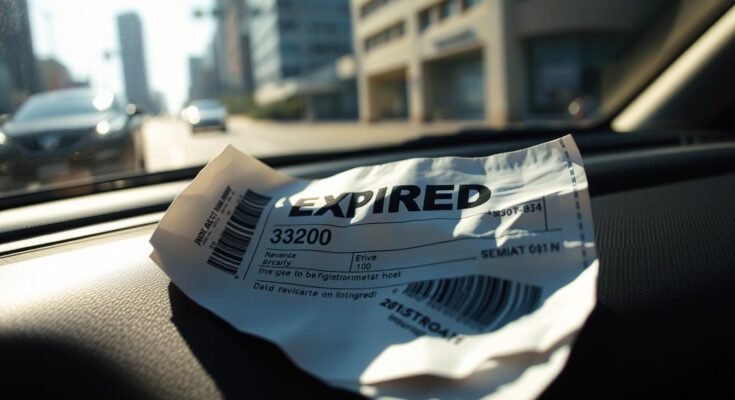As a vehicle owner, you might wonder if an expired registration ticket affects your car insurance. The answer might surprise you. We’ll explore how your vehicle’s registration status ties into your insurance policy. This will help you understand the possible outcomes and guide you through this important part of car ownership.
Key Takeaways
- Expired vehicle registration can affect your car insurance coverage and premiums.
- State-specific laws and insurance requirements play a crucial role in determining the impact.
- Immediate and long-term consequences can range from insurance policy cancellation to increased rates.
- Driving with expired tags can result in fines, penalties, and potential legal issues.
- Proactive steps can help you maintain compliance and avoid registration-related insurance woes.
Understanding Vehicle Registration and Insurance Requirements
Knowing how vehicle registration and insurance work together is key for drivers. Each state in the U.S. has its own licensing laws and insurance rules. It’s important to know these to avoid vehicle registration penalties and keep your insurance claim eligibility safe.
State-Specific Registration Laws
Registration rules differ from state to state. Some have strict renewal deadlines, while others are more relaxed. Knowing your state’s laws helps you avoid vehicle registration penalties.
Mandatory Insurance Coverage Rules
Every state has its own insurance rules too. These rules say how much liability insurance you must have. Not having enough insurance can cause legal problems and hurt your insurance claim eligibility.
Also Read: Standard Insurance Disability Insurance Coverage Guide.
Legal Documentation Requirements
- Proof of ownership (e.g., title, registration)
- Proof of insurance (e.g., insurance card, policy documents)
- Valid driver’s license
Having the right legal documents is crucial for vehicle registration and insurance. Outdated or missing documents can cause delays and vehicle registration penalties.
“Staying on top of your vehicle’s registration and insurance requirements is not only a legal obligation, but also a responsible way to protect yourself and your assets on the road.”
The Direct Link Between Registration Status and Insurance Coverage
Vehicle registration and insurance are closely tied. Your car’s registration status affects your auto insurance policy. Knowing this is key to keeping you safe on the road.
Expired vehicle registration can cause big problems for your insurance. If your tags are out of date, your insurance might not cover you. This means you could be left paying for damages or injuries yourself.
| Expired Registration Consequences | Impact on Auto Policy Premiums |
|---|---|
|
|
Keeping your vehicle registration up to date is a must. It’s not just the law; it’s also a way to protect your insurance. If you forget to renew, you risk losing coverage and facing financial and legal issues.
“Driving with expired registration is a risky proposition that can have serious implications for your insurance coverage and overall financial well-being.”
Does Expired Registration Ticket Affect Insurance? The Complete Answer
An expired registration ticket can affect your car insurance in big ways. It’s important to know how it can change your rates and even cancel your policy. This helps keep your finances safe and follows state laws.
Immediate Insurance Implications
When your vehicle’s registration expires, your insurance company might see you as riskier. This could mean higher car insurance rates or even policy cancellation if you don’t fix it fast. Insurers might think you’re not taking care of your car, which makes them worry about you as a driver.
Also Read: What Is Strategic Limited Partners Health Insurance?
Long-term Effects on Coverage
An expired registration can also affect your insurance for a long time. Insurance companies look at traffic violations and breaking state laws when they decide on your policy. An expired registration ticket can hurt your driving record, leading to higher premiums or trouble getting coverage later.
Policy Cancellation Risks
- Insurers might cancel your policy if they find out your vehicle’s registration is expired. They see it as breaking the policy rules.
- Not renewing your registration on time can also cancel your policy. This leaves you without the law-required coverage.
- Getting your policy back after it’s canceled can be hard and expensive. You might face higher premiums or need to find a new insurance company.
It’s key to keep your vehicle’s registration up to date and follow insurance rules. This avoids problems with expired registration tickets and their effects on your car insurance rates and coverage. Being quick to address these issues helps protect your financial health.
Common Consequences of Driving with Expired Tags
Driving with expired tags can cause legal and financial problems. Drivers might face fines or even have their license suspended. It’s important to renew your vehicle’s registration on time.
One big worry is getting pulled over by police. In most places, expired tags are a traffic offense. This can lead to a ticket and a fine. The cost can be from $50 to $300 or more, depending on where you are and the situation.
-
- Expired tags can lead to traffic stops and citations by law enforcement.
- Fines for driving with expired registration can range from $50 to $300 or more.
Potential Consequences of Driving with Expired Tags Traffic Ticket Fine (typically $50 to $300+) Vehicle Impoundment Release Fees (often $100 to $500+) License Suspension Reinstatement Fees (usually $50 to $150+)
In serious cases, your car might get towed. This can cost $100 to $500 or more to get it back. Also, not having current tags can lead to your license being suspended. This has its own fees to get it back.
How Registration Tickets Impact Your Insurance Premiums
Driving with an expired vehicle registration can really raise your car insurance rates. Insurance companies look at many things when setting your rates. A ticket for an expired registration is one of them. Let’s see how these tickets can change your insurance costs and affect your coverage over time.
Premium Calculation Factors
Insurers check many details to figure out your car insurance rates. Some important factors include:
- Driving record and violation history
- Vehicle details, such as make, model, and year
- Policyholder’s credit-based insurance score
- Geographical location and local traffic conditions
Rate Increase Scenarios
The severity and number of registration-related violations can lead to different rate increases. For example, one expired tag ticket might raise your car insurance rates by 5-10%. But, if you get more tickets, your auto policy premiums could jump by 20% or more.
Insurance Score Effects
A registration ticket can also hurt your insurance score. Insurers use this score to guess how likely you are to file a claim. A bad score means higher car insurance rates. Ignoring registration issues can lower your score, costing you hundreds more in auto policy premiums each year.
Financial Penalties and Additional Costs
Not renewing your vehicle registration on time can cost a lot. In the U.S., vehicle registration penalty fees and registration renewal fines add up fast. This is a big problem for drivers who forget to renew their tags.
The first fine for driving with expired tags is usually between $50 and $300. But there’s more. You might also face extra fines, late fees, and fees to get your registration back. This makes the cost even higher.
| State | Initial Penalty for Expired Registration | Additional Fees |
|---|---|---|
| California | $25 to $200 | Late fee up to $300, vehicle impound fees |
| Texas | $200 to $500 | Late fee up to $250, potential vehicle impound |
| New York | $40 to $150 | Late fee up to $100, DMV transaction fees |
If you don’t fix the problem quickly, things can get worse. Your car might get towed, which costs extra. In some places, driving with expired tags can even lead to jail time.
The costs of vehicle registration penalty and registration renewal fines show why it’s key to keep up with your vehicle’s registration. Ignoring this can turn into a big headache and a big expense.
Also Read: Find Best Hammer Insurance Rates Today.
Insurance Claim Eligibility with Expired Registration
When you file an insurance claim, your vehicle’s registration matters a lot. Expired tags can limit your coverage and even deny your claim. This can be a big problem for drivers.
Coverage Limitations
Insurance policies often have rules about expired tags. Insurers might not cover accidents or damages if your tags are expired. This could mean less money for repairs or even no coverage at all.
Claim Denial Scenarios
- If your tags have been expired for a long time, your insurer might say you lied about your vehicle’s condition. This could mean they deny your claim.
- Driving with expired tags breaks state laws. Insurers might use this to deny coverage for any accidents.
- Insurers might think expired tags mean you didn’t take care of your vehicle. This could also lead to claim denials.
| Expired Tags Consequences | Insurance Claim Eligibility |
|---|---|
| Reduced coverage | Claim may be partially or fully denied |
| Material misrepresentation of vehicle condition | Claim may be denied |
| Violation of state laws | Claim may be denied |
| Lapse in vehicle maintenance | Claim may be denied |
To keep your insurance coverage and claim eligibility, always keep your vehicle’s registration current. This follows state laws and keeps you protected.
Steps to Resolve Registration-Related Insurance Issues
Dealing with expired vehicle registration can be frustrating. But, it’s important to fix it quickly to avoid insurance problems. Here are the steps to solve these issues:
- Renew your vehicle registration as soon as possible. Waiting too long can lead to big registration renewal fines and insurance issues.
- Give your insurance provider proof of registration renewal. This keeps your policy active and follows state laws.
- If you got a citation for expired registration, act fast. Not doing so can lead to license suspension, more fines, and insurance problems.
- Check your insurance policy for rules about expired registration. Some insurers might suspend or cancel your coverage if it’s not current.
- Talk to your insurance agent about the issue. Work together to keep your coverage and avoid any gaps.
By quickly fixing registration issues and talking to your insurance provider, you can avoid big problems. This keeps your coverage strong and avoids unnecessary issues.
| Step | Action | Potential Consequence |
|---|---|---|
| 1. Renew registration | Renew vehicle registration as soon as possible | Registration renewal fines, insurance coverage issues |
| 2. Provide proof of renewal | Submit proof of registration renewal to insurance provider | Avoid coverage lapses and compliance issues |
| 3. Clear citation | Address and resolve expired registration citation | License suspension, additional penalties, insurance problems |
| 4. Review policy | Understand your insurer’s requirements and consequences | Potential temporary suspension or cancellation of coverage |
| 5. Communicate with agent | Proactively discuss the situation with your insurance agent | Avoid lapses in coverage and find a suitable solution |
By following these steps, you can fix any registration-related insurance issues. This keeps your coverage strong and protects you on the road.
Prevention Strategies and Best Practices
To keep your vehicle’s registration up to date and ensure smooth insurance coverage, be proactive. Stay on top of renewal deadlines and follow insurance rules. This way, you can dodge the troubles and penalties of driving with expired tags.
Registration Renewal Tips
- Set calendar reminders or enable automatic renewal notifications to stay informed about your registration expiration date.
- Submit your renewal application well before the due date to allow ample processing time and avoid any lapses.
- Review your state’s licensing laws to understand the specific renewal requirements and procedures.
- Consider opting for multi-year or online renewal options, if available, to simplify the process.
Insurance Compliance Guidelines
- Maintain up-to-date insurance coverage at all times, even if your vehicle is not in use.
- Notify your insurance provider of any changes in your vehicle’s registration status to ensure insurance claim eligibility.
- Keep copies of your insurance ID cards and registration documents readily available in your vehicle.
- Familiarize yourself with your state’s minimum insurance requirements and ensure your policy meets or exceeds those standards.
By following these tips, you can reduce the risks of driving with expired tags. Stay proactive and follow the rules to avoid the troubles of expired tags.
Conclusion
In this article, we’ve looked at how expired vehicle registration affects car insurance. Keeping your registration up to date is more than just following the law. It’s crucial for getting full insurance coverage.
We’ve covered state laws on registration and how they relate to insurance. Driving with expired tags can lead to higher insurance costs and even denied claims. These issues can cause a lot of financial stress.
Now, let’s talk about what you can do. Make sure to renew your registration on time and follow your insurance policy closely. This way, you can avoid problems with your car insurance rates. By being proactive, you protect your finances and feel secure as a car owner.
FAQ
Does expired registration ticket affect insurance?
Yes, an expired registration ticket can affect your insurance. Not renewing your vehicle’s registration on time can cause insurance problems. This might lead to gaps in coverage or even policy cancellation.
How do state-specific registration laws affect insurance requirements?
Each state has its own vehicle registration laws and insurance mandates. Knowing your state’s rules is key. They affect the minimum insurance you need and what documents are required for a valid policy.
What are the legal documentation requirements for vehicle registration and insurance?
Drivers must have current vehicle registration and proof of insurance. Not having these can lead to penalties and policy disruptions.
How does expired registration status impact insurance coverage?
An expired registration can make your insurance policy invalid or limited. Insurance companies might see this as a higher risk. This could lead to higher premiums, policy cancellation, or claim denials.
What are the immediate and long-term consequences of driving with expired tags?
Driving with expired tags can lead to fines, license suspension, and even impoundment. These issues can harm your insurance, causing policy cancellation, rate hikes, and renewal problems.
How do registration tickets affect insurance premiums?
Insurance companies see expired registration as a risk factor. This can lead to higher premiums. Driving with expired tags or late renewals might increase your rates.
What financial penalties and additional costs are associated with expired registration?
Not renewing your registration on time can cost a lot. You might face late fees, fines, and towing or impound costs. These expenses can quickly add up, causing financial stress.
Can I still file an insurance claim if my registration is expired?
Filing a claim with expired registration might be limited or denied. Insurers might see it as a policy breach. This could limit coverage or reject claims, even for unrelated incidents.
What steps can I take to resolve registration-related insurance issues?
To fix insurance problems from expired registration, renew your registration quickly. Update your insurance provider with the new information. This can prevent coverage gaps and avoid penalties or rate hikes.
How can I proactively prevent registration and insurance compliance issues?
To avoid problems, set reminders for registration renewals. Keep active insurance that meets state requirements. Regularly check your policy and stay updated on laws to stay compliant and avoid issues.



